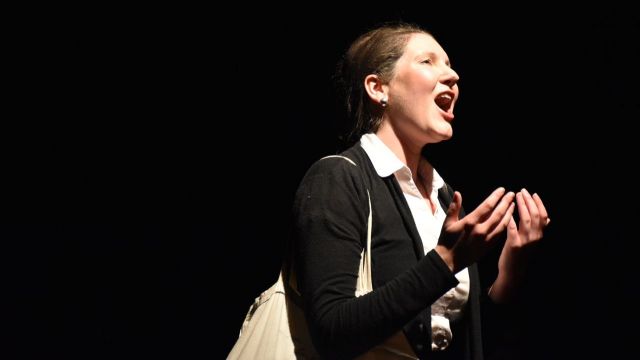A Man of No Importance
Having had no prior knowledge of A Man of No Importance, it was a pleasant, interesting, riveting and moving night to be able to watch this Australian premiere.
Set in the 1960s, and following the story of Alfie Byrne, a bus conductor who also dabbles in local amateur theatrics, the piece explores the scope of Dublin, and the many characters that Alfie interacts with. Alfie, a producer, decides to stage a controversial play in the hall of a local church. Through the musical, Alfie comes to terms with his homosexuality in some excellent scenes that should be considered ground-breaking for student musical theatre.
Aidan Kane plays Alfie beautifully. His realistic portrayal takes the audience all over the emotional path. He’s charming, repressed, kind and altogether someone we feel deeply sorry for. Kane’s vocals are perfect for the role, and his chemistry is electric with those around him.
Direction by Curtis Goding is authentic, and he has utilised the intimacy of King Street well. No awkward exits and entrances, instead allowing for the cast to change, observe and partake always onstage. This gives off a very Once aura, and it sits well with the audience.
In the supporting roles, Robert Boddington’s William Carney, the suburban thespian with more passion than Gielgud, is a total highlight. His booming voice, and enormous stage presence blends well. Boddington’s believable portrayal of the ghost of Oscar Wilde is a beautiful touch. Natasha Stanton’s Lily Byrne, Alfie’s caring and passionate sister, is well-crafted. Her ‘Tell Me Why’highlights not only a personal struggle with homosexuality, but the times struggle with the topic.
It should also be noted that Boddington is credited as a dialect coach, and every Irish accent is near perfect from each individual performer.
 Georgia Melville’s Adele is charming, and her voice makes us believe the role was almost written for her. However, the text does not allow for a more substantial development of her character. Hayden Tonazzi tugs at the audience’s heartstrings with ‘The Cuddles Mary Gave’, although if I am being nit-picky, he was a little too grey for my liking. Daniel Cullen has great boyish charm as Alfie’s crush Robbie, however his number; ‘The Streets of Dublin’ falls a little flat vocally. This is resurrected by a standout ensemble, who make each character their own, and add quirks and movements that show clear artistic choices. Especially in ‘Art’ and ‘Going Up!’ where the irony and drama of amateur theatre is hilariously demonstrated. Special mention to Oliver Cameron, whose performance as Ernie Lally is memorable.
Georgia Melville’s Adele is charming, and her voice makes us believe the role was almost written for her. However, the text does not allow for a more substantial development of her character. Hayden Tonazzi tugs at the audience’s heartstrings with ‘The Cuddles Mary Gave’, although if I am being nit-picky, he was a little too grey for my liking. Daniel Cullen has great boyish charm as Alfie’s crush Robbie, however his number; ‘The Streets of Dublin’ falls a little flat vocally. This is resurrected by a standout ensemble, who make each character their own, and add quirks and movements that show clear artistic choices. Especially in ‘Art’ and ‘Going Up!’ where the irony and drama of amateur theatre is hilariously demonstrated. Special mention to Oliver Cameron, whose performance as Ernie Lally is memorable.
Doug Emery’s band is a little too loud at times, sometimes drowning out the softer moments from Kane and Melville. This is only a slight issue, as the band provides a sound so authentic you’d think you were in the back streets of Dublin drinking Guinness. Mr. Emery should be applauded for crafting a sound dynamic that has the ability to bring to life such a distinctive score.
Lighting design by Jonathan Rush is appropriate, and Bronwyn Hick’s costumes are simple yet effective.
Fortunately (and unfortunately) the show has sold out for its extremely limited season. However, one hopes that this is not the last time we see it on our stages. MUSE has done wonders with the show, tackling issues that are as relevant as they were fifty years ago.
Jordan Shea
Subscribe to our E-Newsletter, buy our latest print edition or find a Performing Arts book at Book Nook.

